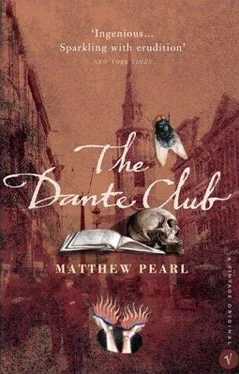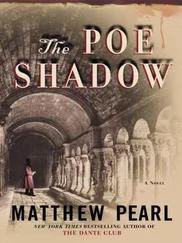Fields’s connection to Harvard was as the university’s publisher. The other scholars had stronger ties: Longfellow had been its most famous professor until retiring about ten years earlier to devote himself fully to his poetry; Oliver Wendell Holmes, James Russell Lowell, and George Washington Greene were alumni; and Holmes and Lowell were celebrated professor—Holmes holding the Parkman anatomy chair at the Medical College and Lowell being the head of modern languages and literature at Harvard College, which had been Longfellow’s former post.
“This will be seen as a masterwork springing from the heart of Boston and from the soul of Harvard, my dear Osgood. Even Augustus Manning is not so blind as to miss that.”
Dr. Oliver Wendell Holmes, medical professor and poet, hurried through the cropped paths of the Boston Common in the direction of his publisher’s office as though he were being chased (stopping twice, however, to sign his autograph). If you passed close enough to Dr. Holmes or were one of those amblers who wielded your pen on behalf of your autograph book, you could hear him humming with purpose. In his moire silk waistcoat pocket burned the folded rectangle of paper that drove the little doctor on toward the Corner (that is, the office of his publisher) and drove him to fear.
When encountered by admirers, he sparkled to hear them name their favorites. “Oh, that . They say President Lincoln recited that poem by memory. Well, truly, he told me himself…” The shape of Holmes’s boyish face, the small mouth pushing against the loose jaw, made it appear an effort for him to keep his mouth closed for any noticeable period of time.
After the autograph hounds, he came to a stop only once, haltingly, at the Dutton & Company Bookstore, where he counted out three novels and four volumes of poetry from entirely new and (in all probability) young New York authors. Every week the literary notices announced that the most extraordinary book of the age had just been published. “Profound originality” had become so plentiful that, not knowing better, one could take it for the most common national product. Just a few years before the war, it seemed the only book in the world was his Autocrat of the Breakfast-Table , the serialized essay with which Holmes had surpassed all expectations by inventing a new attitude for literature, one of personal observation.
Holmes burst into the vast front showroom of Ticknor & Fields. Like the Jews of old at the Second Temple remembering the glories it replaced, Dr. Holmes could not help resisting the oiled and polished glare and smuggling in his sensory recall of the musty quarters of the Old Corner Bookstore, on Washington and School streets, into which the publishing house and its authors had squeezed for decades. Fields’s authors called the new palace, at the corner of Tremont Street and Hamilton Place, the Corner or New Corner—in part from habit, but also as pointed nostalgia for their beginnings.
“Good evening, Dr. Holmes. Here for Mr. Fields?”
Miss Cecilia Emory, the pleasing blue-bonneted girl at the front desk, received Dr. Holmes in a cloud of perfume and a warming smile. Fields had taken on several women as secretaries when the Corner opened a month earlier, despite a chorus of critics, who condemned the practice for a building otherwise crowded with men. The idea almost certainly originated with Fields’s wife, Annie, willful and beautiful (qualities usually allied).
“Yes, my dear.” Holmes bowed. “Is he in?”
“Ah, is that the great Autocrat of the Breakfast-Table descended before us?”
Samuel Ticknor, one of the clerks, was passing an overlong good-bye with Cecilia Emory as he slipped on his gloves. Not the average publishing-house clerk, Ticknor would be welcomed home by wife and servants on one of the most desirable corners of Back Bay.
Holmes took his hand. “Grand little place the New Corner is, isn’t it, my dear Mr. Ticknor?” He laughed. “I’m half surprised our Mr. Fields hasn’t gotten lost in here yet.”
“Hasn’t he,” Samuel Ticknor muttered back seriously, followed by a light snigger or grunt.
J. R. Osgood came to usher Holmes upstairs. “Pay him no mind, Dr. Holmes,” Osgood sniffed, watching the him in question saunter onto Tremont Street and toss money at the peanut vendor on the corner as he would at a beggar. “I daresay young Ticknor believes he should command the same view of the Common as his father would have were he alive, on the basis of name alone. And wants everyone to know it, too.”
Dr. Holmes had no time for gossip—not today, at least.
Osgood noted that Fields was in meetings, so Holmes was purgatoried in the Authors’ Room, a plush chamber for the comfort and pleasure of the house’s writers. On an ordinary day, Holmes might well spend his time admiring the literary mementos and autographs hanging on the wall that included his name. Instead, his attention turned to the check that he drew flinchingly out of his pocket. In the taunting number written out in careless hand Holmes saw his failures. He saw in the stray ink spots his life as a poet, battered by the events of the last years, incapable of rising to past achievements. He sat in silence and rubbed the check roughly between his forefinger and thumb as Aladdin might his old lamp. Holmes imagined all the fearless, fresher authors Fields was courting, convincing, shaping.
He wandered from the Authors’ Room twice, twice finding Fields’s office shut. But before he could turn back this second time, the voice of James Russell Lowell, poet and editor, found its way out. Lowell was speaking forcefully (as always), even dramatically, and Dr. Holmes, instead of knocking or turning away, tried to decipher the conversation, for he believed it would almost certainly have something to do with him.
Narrowing his eyes as though he could transfer their share of power to his ears, Holmes was just making out an intriguing word when he hit something and tumbled.
The young man who had come to a sudden halt in front of the eavesdropper flailed his hands in stupid repentance.
“My fault entirely, dear lad,” the poet said, laughing. “Dr. Holmes, and it’s…”
“Teal, Doctor, sir,” the trembler, a shop boy, managed to introduce himself before turning yellow and scurrying away.
“I see you’ve met Daniel Teal.” Osgood, the senior clerk, appeared from the hall. “Couldn’t keep a hotel, but as hard a worker as we have.” Holmes chuckled with Osgood: poor lad, still green around the ears at the firm and nearly knocking heads with Oliver Wendell Holmes! This renewed self-importance made the poet smile.
“Would you like me to check on Mr. Fields?” Osgood asked.
Then the door opened from inside. James Russell Lowell, majestically untidy, his penetrating gray eyes taking one’s attention from the woolliness of his hair and the beard that he smoothed with two fingers, looked out from the threshold. He was in Fields’s office alone with today’s newspaper.
Holmes imagined what Lowell would say if he attempted to share his anxiety: This is a time to concentrate all energies on Longfellow, on Dante, Holmes, not our petty vanities … “Come, come , Wendell!” Lowell started to make him a drink.
Holmes said, “Why, Lowell, I did believe I heard voices in here just now. Ghosts?”
“When Coleridge was asked whether he believed in ghosts, he replied in the negative, explaining he had seen far too many of them.” He laughed gleefully and twisted out the glowing end of his cigar. “Oh, the Dante Club shall celebrate tonight. I was just reading this aloud to see how it sounded, you see.” Lowell pointed to the newspaper on the side table. Fields, he explained, had stepped down to the cafeteria.
Читать дальше












